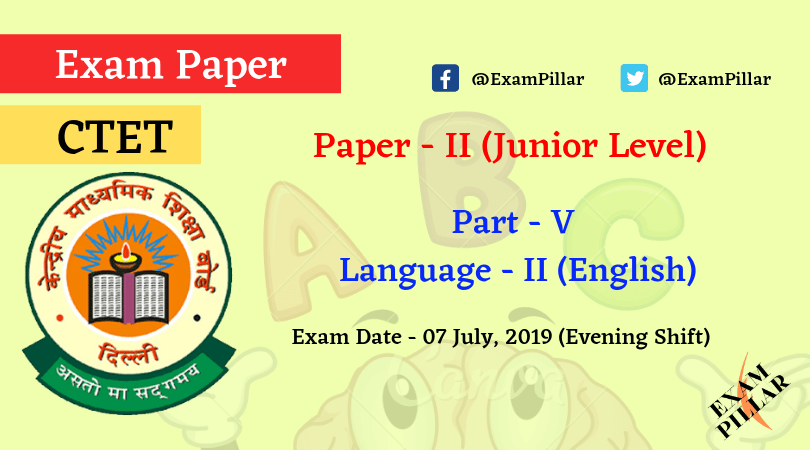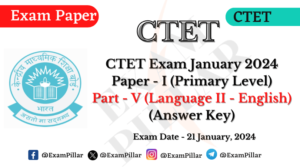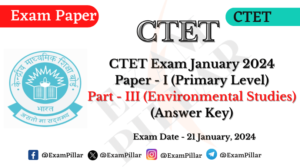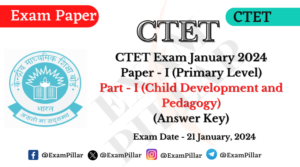CBSE conducted the CTET (Central Teacher Eligibility Test) Exam Paper held on 07th July 2019 Evening Shift. Here The CTET Paper – II Part – V Language – II (English) Question Paper with Answer Key. CTET July 2019 Answer Key.
CTET (Central Teachers Eligibility Test)
Paper – II Junior Level (Class 6 to Class 8)
Exam – CTET Paper II Junior Level (Class VI to VIII)
Part – Part – V Language – II (English)
Organized – CBSE
Number of Question – 30
Paper Set – Y
Exam Date – 07th July 2019 (Evening Shift 02:00 PM – 04:30 PM)
Read Also …
- CTET 2019 Paper – II – Part – I – बाल विकास और शिक्षा-शास्त्र (हिंदी)
- CTET 2019 Paper – II – Part – I – Child Development and Pedagogy (English)
- CTET 2019 Paper – II – Part – II – गणित और विज्ञान (Mathematics and Science)
- CTET 2019 Paper – II – Part – III – सामाजिक अध्ययन / सामाजिक विज्ञान (Social Studies/Social Science)
- CTET 2019 Paper – II – Part – IV – Language – I (English)
- CTET 2019 Paper – II – Part – IV – Language – I हिंदी (Hindi)
- CTET 2019 Paper – II – Part – V – Language – II हिंदी (Hindi)
CTET Exam July 2019 Paper – 2 (Junior Level)
Part – V – Language – II (English)
Directions : Read the passage given below and answer the questions (121 – 128) by selecting the correct/most appropriate options :
The other day I received an unusual and very gratifying gift : I was given a tree. Or rather, I was given half-a-dozen trees, which would be planted on my behalf. I had been invited to give a talk to an organisation. After such events, the speaker is usually given a token gift. Sometimes the gift is that of a pen, or something useful. Often, the gift is in the form of a plaque or similar commemorative token. However well-meant, such gifts are destined to gather dust in forgotten corners. Which is why I was agreeably surprised to be given a scroll which attested that, in a designated plantation established for the purpose, six tress would be added in my name, as part of ‘green’ movement being sponsored by the organization.
In an increasingly environmentally conscious world, the gift of a living tree or plant makes for a perfect present. The tradition of giving and receiving gifts has increasingly become a highly evolved marketing exercise. Apart from festivals like Diwali, Holi, Christmas, Eid and others, a whole new calendar of celebratory events has been created to promote the giving of gifts : Mother’s Day, Father’s Day, Teacher’s Day, Valentine’s Day and so on and on.
What do you give to people – friends, relatives, spouses, children, parents, employees, clients, well-wishers who have more or less everything, or at least everything that you could afford to give them as a gift ? Another shirt or kurta ? Another bottle of scent or aftershave ? Another box of chocolates ? Another any other ?
121. The word ‘destined’ means :
(1) declined
(2) departed
(3) fated
(4) decided
Show Answer/Hide
122. Name the part of speech of the underlined word in the following clause.
which is why I was agreeably surprised.
(1) Pronoun
(2) Adverb
(3) Preposition
(4) Adjective
Show Answer/Hide
123. Identify the part of the following sentence which has an error in it.
Your claim ought (a)/ to succeed in that case (b) / the damages (c) / will be substantial. (d)
(1) (c)
(2) (d)
(3) (a)
(4) (b)
Show Answer/Hide
124. The writer was thrilled when he was given
(1) a plaque
(2) a pen
(3) a tree
(4) six trees
Show Answer/Hide
125. What usually happens to the gifts he/she receives ?
(1) They are put away and forgotten.
(2) He keeps them religiously as mementoes.
(3) He uses them if he needs them.
(4) He gives them away as gifts to others.
Show Answer/Hide
126. The gift received by the writer was :
(1) very expensive
(2) gathering dust in a corner
(3) a marketing exercise
(4) environment friendly
Show Answer/Hide
127. Why do you not very much care for it when you receive a shirt or a kurta as a gift?
(1) You don’t like the colour.
(2) You were not asked about your choice.
(3) The giver had to spend a lot of money.
(4) You already have so many of them.
Show Answer/Hide
128. The word ‘gratifying’ means
(1) giving
(3) fortifying
(3) annoying
(4) satisfying
Show Answer/Hide
Directions : Read the passage given below and answer the questions (129 – 135) by selecting the correct/most appropriate options :
With more then 3,000 languages currently spoken, English undoubtedly is amongst the richest of all languages. The Oxford English Dictionary lists about half a million words of which only 2,00,000 are frequently used. This is because, the balance 3,00,000 words are technical and not found in ordinary dictionaries. The only language that can come near English is Chinese.
Apart from being the richest language, English also boasts of being one of the most widely spoken, second only to Mandarin Chinese. This remarkable achievement is only because of the one thing that we all love to do – copy ! ‘Siesta’ for example is of Spanish origin. “Sputnik’ as you must be aware of, has a Russian origin. Restaurant is from France and “Super’ 212 from Germany. Even before the birth of the ‘genius’ of ‘drama’, William Shakespeare, the words ‘genius’ and ‘drama’ were adapted from Greek. Now, you must be wondering if English has anything original about it. Well, find it out ! Did you ever try to find out how many different words of English we use in our daily life ? Try to guess and then read on. A modern novelist has a vocabulary of anywhere between ten to fifteen thousand words.
William Shakespeare used thirty thousand words and the only writer to come close to him was James Joyce in ‘Ulysses’. We normally have a vocabulary of about ten thousand words of which only five thousand are used in everyday conversation. This leads to a limited variety of words. This is because we repeat a lot of words. In conversation and in writing, it is ‘the’. (Try counting it in this article and you will have proof of it.)
129. The word that is similar in meaning to the word, ‘remarkable’ is :
(1) remaining
(2) optional
(3) astonishing
(4) remedial
Show Answer/Hide
130. The word that is opposite in meaning to the word, ‘ordinary’ is :
(1) special
(2) liable
(3) usual
(4) complex
Show Answer/Hide
131. Which part of speech is the underlined word in the following sentence ?
Did you ever try to find out ?
(1) Pronoun
(2) Verb
(3) Adverb
(4) Adjective
Show Answer/Hide
132. English is the most widely used language in the world because :
(1) it has taken words from other languages.
(2) it has half a million words in it.
(3) Shakespeare has written in English.
(4) it is the richest language.
Show Answer/Hide
133. In our everyday conversation we use a limited number of words because :
(1) everybody is not highly educated.
(2) we repeat a lot of words.
(3) our vocabulary is unlimited.
(4) we are not a genius like Shakespeare.
Show Answer/Hide
134. How many words are usually used by an English speaking person ?
(1) 10,000
(2) 15,000
(3) 3,000
(4) 5,000
Show Answer/Hide
135. Which of the following words is most often used in English language ?
(1) is
(2) one
(3) a
(4) the
Show Answer/Hide





Awesome